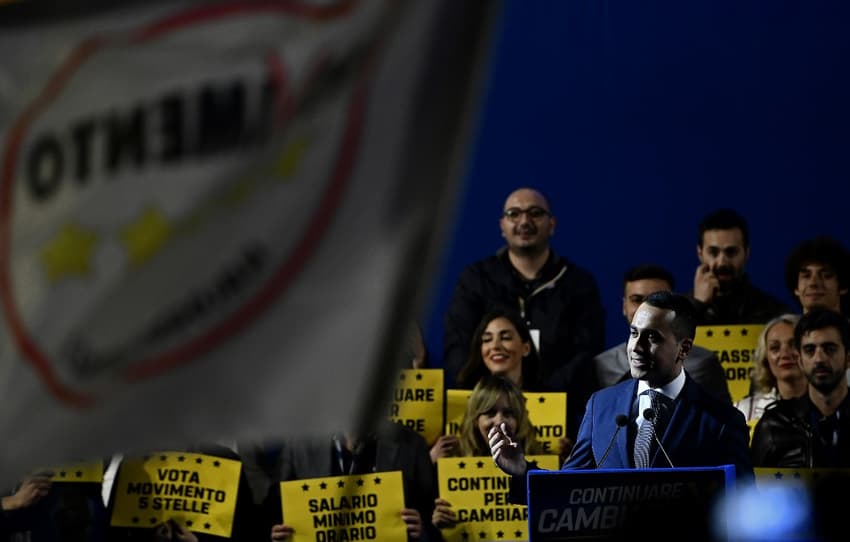Italy's Five Star Movement votes to keep Luigi Di Maio as leader

Italy's anti-establishment Five Star Movement (M5S) voted Thursday to keep leader Luigi Di Maio after the party's flop in European elections.
Some 80 percent of those who voted on the M5S online platform said he should stay on, according to the M5S official blog.
The M5S rules in coalition with Matteo Salvini's hard-right League, which won a resounding victory in Italy on the back of an "Italians First" campaign, dealing a blow to the M5S and threatening the stability of the government.
READ ALSO:
-
Italy's EU election results by region: Who won where?
-
The biggest winners and losers in Italy's EU election results
-
League victory in EU vote strains Italian government
"You decide. I am asking to put my role as party leader to the vote," Di Maio wrote on the blog as called the vote on Wednesday. "If the Movement renews its faith in me, we'll get to work... with even more commitment and dedication."
Some 44,850 members voted to save Di Maio's job, compared to around 11,300 who wanted him gone.
The EU vote results confirmed the reversal of fortunes of the ruling parties, with M5S -- which got 32.5 percent at the general election -- taking just 17 percent on Sunday compared to the League's 34 percent.
READ ALSO:
-
Luigi Di Maio, the face of Italian populism
-
Political cheat sheet: Understanding Italy's Five Star Movement
-
ANALYSIS: Is Italy's Five Star Movement still 'anti-establishment'?
The M5S chief had been criticised by part of the Movement's base for taking on too much with his three roles as party head, deputy prime minister and economic development, labour and social policies minister.
Di Maio blamed the M5S's poor performance on low voter turnout, as well as a mud-slinging campaign by the League against which it was slow to retaliate.
He received a show of support on Wednesday from comedian Beppe Grillo, the M5S co-founder, who remains an influential figure within the Movement despite withdrawing from the political scene to focus on his stand-up career.

Beppe Grillo (L) and the party's new leader Luigi Di Maio with the Five Star Movement's new logo. Photo: Andreas Solaro/AFP
"The Movement has suffered a defeat and must react," he conceded on his website. However, he said he was "wounded" by those M5S members who were acting "as if it were a drop in the sales of a multinational company".
"Luigi has not committed any crime, he is not involved in any scandal. He must carry on the fight," Grillo said.
Comments
See Also
Some 80 percent of those who voted on the M5S online platform said he should stay on, according to the M5S official blog.
The M5S rules in coalition with Matteo Salvini's hard-right League, which won a resounding victory in Italy on the back of an "Italians First" campaign, dealing a blow to the M5S and threatening the stability of the government.
READ ALSO:
- Italy's EU election results by region: Who won where?
- The biggest winners and losers in Italy's EU election results
- League victory in EU vote strains Italian government
"You decide. I am asking to put my role as party leader to the vote," Di Maio wrote on the blog as called the vote on Wednesday. "If the Movement renews its faith in me, we'll get to work... with even more commitment and dedication."
Some 44,850 members voted to save Di Maio's job, compared to around 11,300 who wanted him gone.
The EU vote results confirmed the reversal of fortunes of the ruling parties, with M5S -- which got 32.5 percent at the general election -- taking just 17 percent on Sunday compared to the League's 34 percent.
READ ALSO:
- Luigi Di Maio, the face of Italian populism
- Political cheat sheet: Understanding Italy's Five Star Movement
- ANALYSIS: Is Italy's Five Star Movement still 'anti-establishment'?
The M5S chief had been criticised by part of the Movement's base for taking on too much with his three roles as party head, deputy prime minister and economic development, labour and social policies minister.
Di Maio blamed the M5S's poor performance on low voter turnout, as well as a mud-slinging campaign by the League against which it was slow to retaliate.
He received a show of support on Wednesday from comedian Beppe Grillo, the M5S co-founder, who remains an influential figure within the Movement despite withdrawing from the political scene to focus on his stand-up career.

Beppe Grillo (L) and the party's new leader Luigi Di Maio with the Five Star Movement's new logo. Photo: Andreas Solaro/AFP
"The Movement has suffered a defeat and must react," he conceded on his website. However, he said he was "wounded" by those M5S members who were acting "as if it were a drop in the sales of a multinational company".
"Luigi has not committed any crime, he is not involved in any scandal. He must carry on the fight," Grillo said.
Join the conversation in our comments section below. Share your own views and experience and if you have a question or suggestion for our journalists then email us at [email protected].
Please keep comments civil, constructive and on topic – and make sure to read our terms of use before getting involved.
Please log in here to leave a comment.